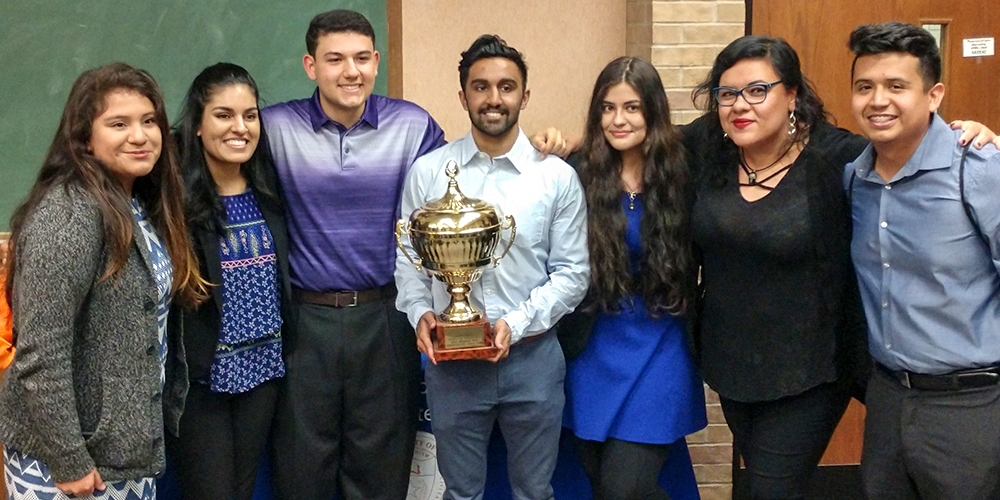Comets Reclaim Brain Bowl Title

Seven UT Dallas undergraduate neuroscience students recently prevailed at the 2018 Brain Bowl, an academic competition sponsored by the Center for Biomedical Neuroscience at the UT Health Science Center in San Antonio.
The Comets team of (from left) Maribel Diaz, Trisha Sharma, Alfarooq El-Eishy, Sarosh Din, Sonia Khan, Alyssa Ortega and Luis Castro overcame UT San Antonio and UT Arlington for a third win in the history of the competition.
The format of the competition pits three four-player teams against each other, buzzing in to answer questions on neurophysiology and anatomy, neurochemistry, drugs and the brain, and behavioral science.
Alfarooq El-Eishy, the lone holdover from the last victorious UT Dallas team in 2015, said he and his teammates were motivated by last year’s loss to UT Arlington.
“With more classes under my belt and a renewed spirit, I was positive that we would take home the gold for the University,” El-Eishy said.
The competition provides a unique annual challenge for students passionate about the subject.
“We were excited at the chance to prove ourselves against other like-minded students,” El-Eishy said. “We heard amazing things about the Health Science Center and the San Antonio community, and were excited to have the opportunity to visit. The experience was truly a thrill.”
Dr. Ted Price BS’97, Fellow, Eugene McDermott Professor and an associate professor of neuroscience in the School of Behavioral and Brain Sciences, studied at UTHSC for seven years. He described the victory as “a great source of pride for me to see the students from my undergrad alma mater go to my PhD alma mater and win.”
“This is an amazing opportunity for our students to compete against their peers from other programs in Texas — but, more importantly, it is a great chance for them to flex their neuroscience muscles for the faculty of UT Health San Antonio,” Price said. “The competition is always full of professors from the pharmacology, neuroscience and medicine programs, so it’s a great chance to impress very influential people for medical and PhD program applications.”
El-Eishy said the assistance his team received from faculty and staff were crucial to their success.
“We’re very thankful for the support of Dr. Price and Mr. Chavez,” El-Eishy said, referring to academic support coordinator Marcos Chavez, from the cognition and neuroscience program. “Dr. Price pointed out high-yield topics for us to focus on in our preparation.”
–Stephen Fontenot



